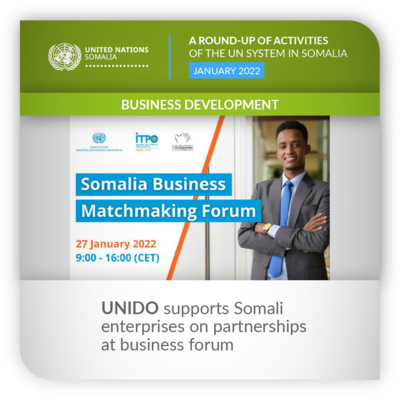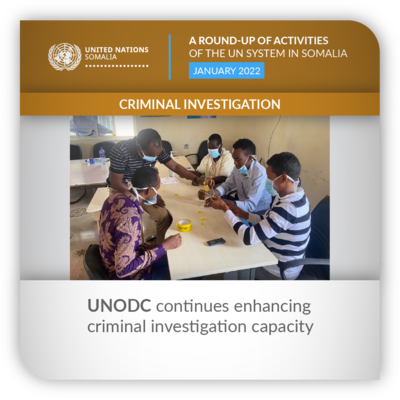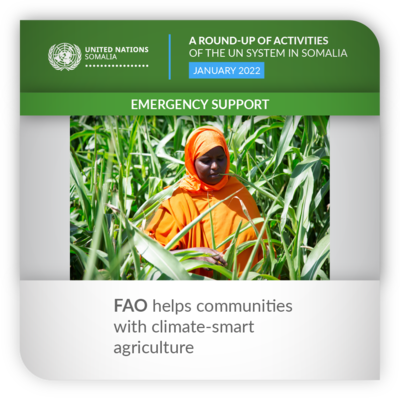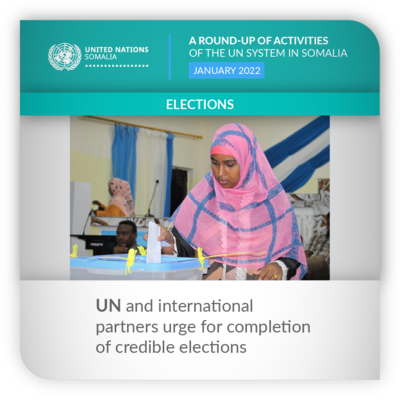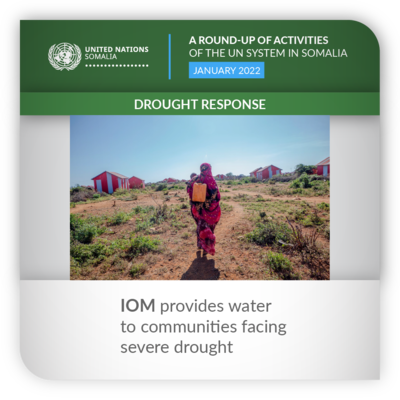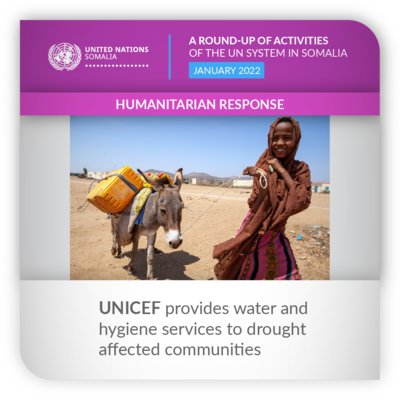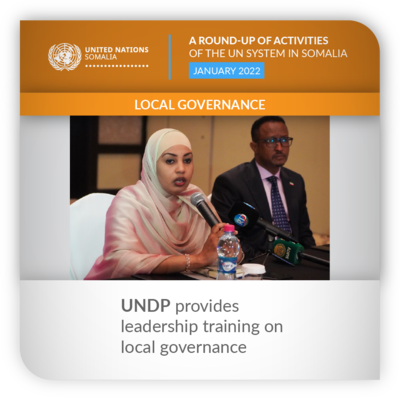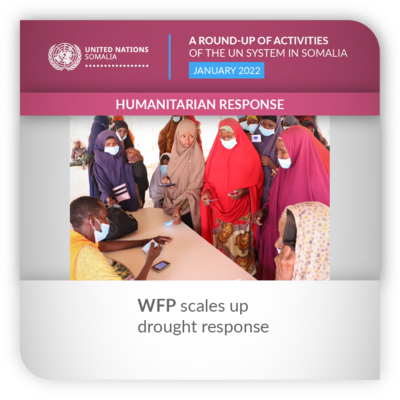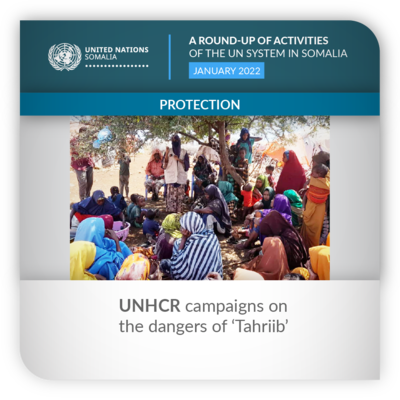A round-up of activities of the UN system in Somalia in January 2022
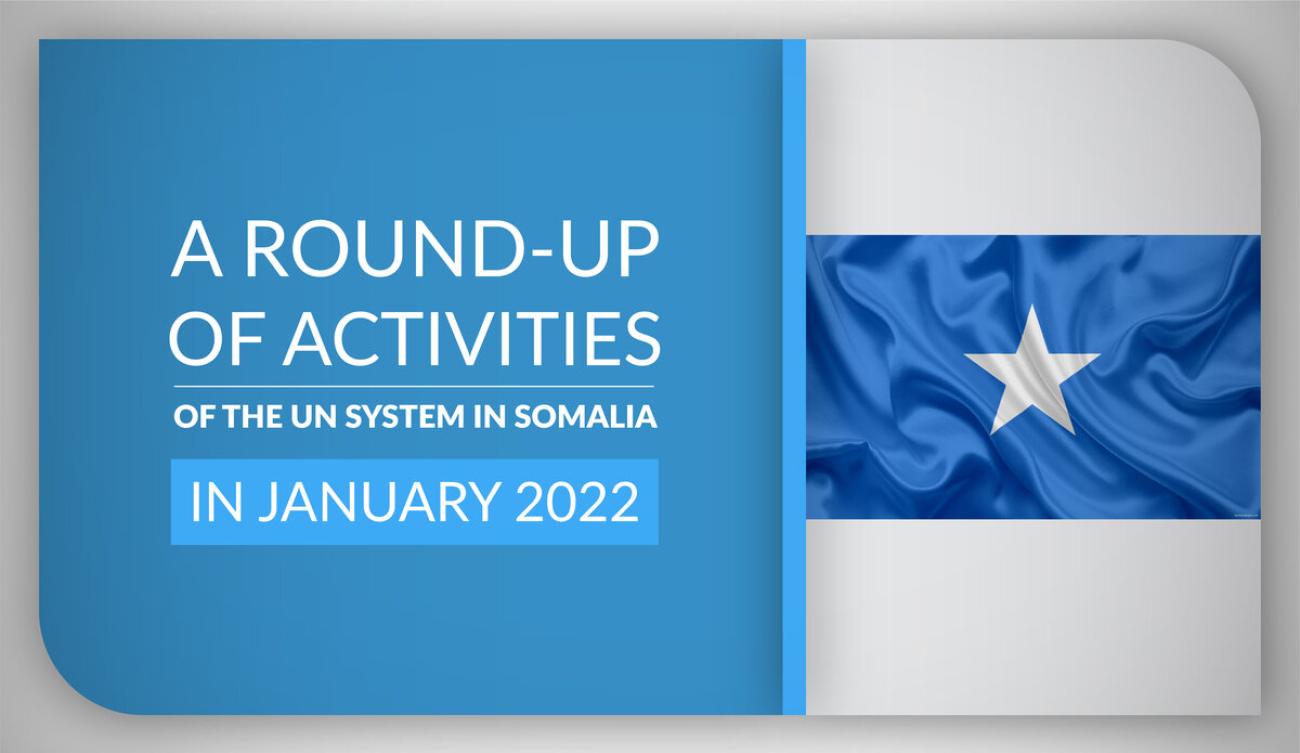
Highlights from the UN system work in Somalia in January 2022.
|
|
Business development | UNIDO supports Somali enterprises on partnerships at business forum UNIDO held the Somalia Business Matchmaking Online Forum, which offered a platform to more than 20 Somali enterprises operating in different sectors - such as agriculture, agro-industry, fishery, poultry, livestock and dairy - to engage with foreign companies which are interested in exploring innovative opportunities for business, trade, and investment in the Somali market. The virtual meeting was facilitated by the UNIDO team at the Investment Technology Promotion Office of UNIDO in Rome. The 20 small- to medium-sized enterprises were identified and supported by the network of Enterprise Development Units which are hosted in the various Somali Chamber of Commerce and Industries around the country. In the marketplace section, Somali companies had the opportunity to form potential business partnerships, create opportunities to showcase and explore innovative technologies in Somalia. |
|
|
|
Criminal Investigation | UNODC continues enhancing criminal investigation capacity UNODC provided a sixth training programme for Somali police officers, with the latest training taking place in Jubaland and involving 10 participants. The training was part of UNODC’s Investigator Development Pathway scheme, which aims to enhance the criminal investigation capacity of investigators and officers from the Somali Police Force. Funding was provided by the U.S. State Department’s Bureau of International Narcotics and Law Enforcement Affairs, and the training was designed by UNODC and implemented as part of its Criminal Investigation Programme, also known as CIP. |
|
|
|
Emergency support | FAO helps communities with climate-smart agriculture Families in the Borama District of Somaliland have been hit hard by desert locusts and recurrent drought. Many have resorted to migrating to population centres in search of assistance after their crops and livelihoods were dried up or eaten by insects. With funding from the Swedish International Development Agency (SIDA), FAO has been supporting rural farmers with cash transfers, climate-smart agricultural practices and drought tolerant seeds. The assistance has not just helped address acute food insecurity but also mitigated further displacement in local communities and better equipped residents for the challenges of an uncertain future. |
|
|
|
Elections | UN and international partners urge for completion of credible elections The United Nations in Somalia joined the country’s other international partners in calling on all Somali political leaders to put the national interest first, prioritize the conclusion of an electoral process broadly accepted by Somalia’s people, and avoid provocations that may distract from that process and increase the risk of confrontation or even violence. The joint statement from the partners followed a meeting of the National Consultative Council, held on 3-9 January, in which the Council members reached consensus on procedural updates and an expedited timeline for the House of the People elections. “We are pleased that the Prime Minister and the Federal Member State leaders made decisions on the basis of consultations with civil society, women representatives and opposition figures,” the partners said. “It is time for all Somali leaders to focus on the rapid implementation of agreed decisions so that a credible electoral process can be concluded by 25 February.” |
|
|
|
Drought Response | IOM provides water to communities facing severe drought IOM worked closely with the government, UN agencies and local partners to address the acute water needs of internally displaced persons (IDPs), migrants, and vulnerable groups facing severe drought conditions. This support included activities such as water trucking, the distribution of hygiene kits, and the construction of boreholes and shallows across 103 locations in south and central Somalia. The ongoing intervention is expected to reach 255,000 people by the end of March. These efforts aim to prevent a humanitarian disaster that would exacerbate significant existing needs driven by ongoing conflict and additional climate change impacts. |
|
|
|
Humanitarian Response | UNICEF provides water and hygiene services to drought affected communities The ongoing drought has affected an estimated 3.2 million people and displaced 245,000. Since November, water prices in some of the worst-affected states have risen by as much as 72 per cent and food security is predicted to worsen. In response, UNICEF is scaling up its water and hygiene response and in December 2021 reached an estimated 173,000 people with emergency water services and 8,000 with sustainable water provision. In addition, 18,000 people were reached with hygiene promotion activities and supplied with hygiene kits. In total, UNICEF has provided emergency water supply to half a million people since June last year, and sustainable water supply to an estimated 200,000 people. In addition, about 175,000 people have been supplied with hygiene kits and reached with hygiene promotion activities. |
|
|
|
Local governance | UNDP provides leadership training on local governance UNDP, through the Joint Programme on Local Governance (JPLG) project, provided leadership training for mayors, deputy mayors and staff working on local governance in 13 districts across Somaliland. Topics covered how to lead in a way that drives organisational goals, the importance of including all stakeholders in political processes and the drafting of legislation, and how to identify new ways to ensure women play key roles in all areas of work. |
|
|
|
Humanitarian Response | WFP scales up drought response WFP began a major scale-up of its food relief operations in Somalia, in response to the ongoing drought and deteriorating food security situation. The number of acutely food insecure people is expected to increase from 3.5 to 4.6 million between February and May if humanitarian assistance is not received. From January to June this year, WFP aims to reach 2.5 million people with cash-based and in-kind food relief - over half a million more than its prior relief caseload. This rapid scale-up builds on lessons from earlier droughts, recognizing the importance of early action. WFP food relief is complemented by nutrition and logistics support, and by livelihoods, resilience and food systems interventions to protect recent development gains and strengthen vulnerable Somalis against droughts and other crises in the long-term. |
|
|
|
Protection | UNHCR campaigns on the dangers of ‘Tahriib’ UNHCR continues to create awareness-raising campaigns on the dangers of irregular movements, known as ‘Tahriib’ in Somalia. In January, more than 2,000 people were reached through face-to-face outreach activities in communities and schools across Somalia. During the schools’ outreach campaign in Baidoa, a total of 60 storybooks were distributed and book-reading sessions were conducted in classes. The campaign seeks to raise awareness among people, especially youth, about making an informed choice or decision about their movement and future but not stop them from moving. |

